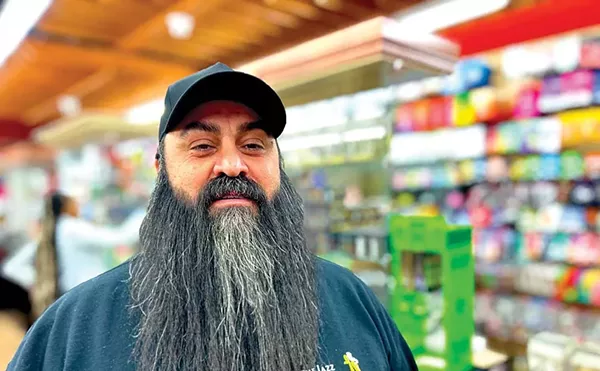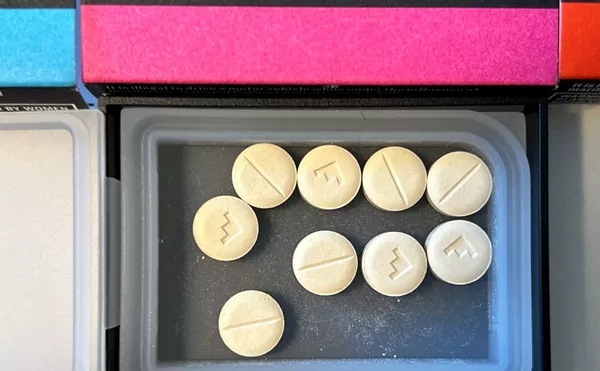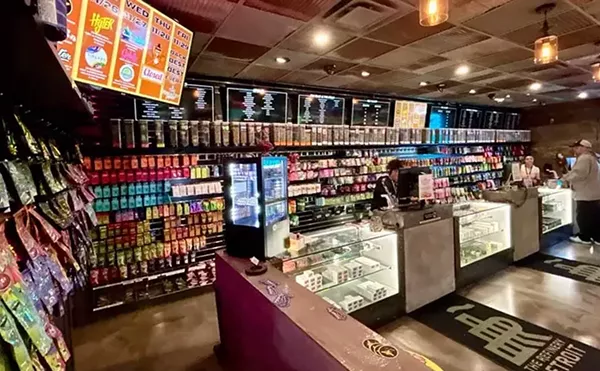Ron Paul says stop the war; Michigan debates strategy
From republicans to the public at large, support for the War on Drugs is fading

Audio By Carbonatix
[
{
"name": "GPT - Leaderboard - Inline - Content",
"component": "35519556",
"insertPoint": "5th",
"startingPoint": "3",
"requiredCountToDisplay": "3",
"maxInsertions": 100,
"adList": [
{
"adPreset": "LeaderboardInline"
}
]
}
]
Last week on CNN, Republican presidential candidate Rep. Ron Paul of Texas said of the War on Drugs: "I think that's another war we ought to cancel. Because it's to nobody's benefit. And that's where the violence is coming from."
When asked to clarify his statement, Paul said, "I think the federal War on Drugs is a total failure. You can at least let sick people have marijuana because it's helpful. ... Alcohol's a deadly drug. The really deadly drugs are the prescription drugs. They kill a lot more people than the illegal drugs. The drug war is out of control. I fear the drug war because it undermines our civil liberties, it magnifies our problems on the borders, and we've spent like over the last 40 years a trillion dollars on this war. And believe me, the kids can still get the drugs. It just hasn't worked."
That makes two Republican contenders in favor of marijuana legalization, Paul and former New Mexico Gov. Gary Johnson.
I don't think I could've come up with a better perspective than Paul's to get into this week's subject, which is where are we going with marijuana initiatives in Michigan. Last time I wrote this column, I covered discussions going on around the state regarding possible petition initiatives about marijuana for the 2012 ballot. Some activists are pushing for a petition to get decriminalization of marijuana on the ballot. Others think we should push for out-and-out legalization. There is another line of discussion saying the state should reschedule marijuana as a less dangerous substance. I called for readers to give their opinion on the subject. I got 34 online comments on the column and six letters to the editor. Not all of them were from people in Michigan — two were from people planning to move to Michigan partly because of the medical marijuana law. And one person wanted to debate about where the violence among drug users is coming from, but I'm going to ignore that for today.
Among those who stayed on subject and answered the question, 18 called for full legalization, and two called for decriminalization. Four just wanted to rant about Michigan Attorney General Bill Schuette. The attorney general's latest act to earn the vitriol was his pronouncement that if police confiscate marijuana from someone and it is later proven that they are legitimate patients or caregivers that police cannot return their medical pot to them because they would be breaking federal law. (BTW, that runs counter to the majority of case law on that over the past several years.)
And then there were a few comments that were hard to categorize, such as "Free the weed," which one might take as a legalize-it vote, but I didn't want to be presumptive.
Anyhow, this was a far cry from any kind of scientific sampling and obviously those who spoke their piece are overwhelmingly in favor of legalization. I've got to say that your comments were heartfelt and some are worthy of repeating.
"I'm for full legalization, most definitely. I plan to work as hard as possible to oppose any of the legislators (and other elected officials) that are involved in messing with this citizens' law. Also, when it comes time for their re-election, I will work even harder toward their defeat at the polls. My archives are huge, my memory is long and my will is unstoppable," offered an online commentator who signed on as Saginaw Dave.
Online commentator Malcolmkyle wrote: "Most of us are aware by now that individuals who use illegal drugs are going to get high, 'no matter what.' So why do you not prefer they acquire them in stores that check IDs and pay taxes? Gifting the market in narcotics to ruthless criminals, foreign terrorists and corrupt law enforcement officials is seriously compromising our future. If you remotely believe that people will one day quit using any of these 'at present' illegal drugs, then you are exhibiting a degree of naïveté parallel only with those poor wretches who voluntarily drank the poisoned Kool-Aid in Jonestown."
"Anything less than full legalization is unacceptable. We are going to push till it hurts in the UP. We have the facts and the public on our side," notes "pc mike of the u.p."
And Christeen noted online: "Enough of the idiocy! It's time to change federal law and STOP wasting taxpayers' money and police resources on marijuana! Banning adult marijuana sales makes children less safe by creating large profits for drug dealers where otherwise there would be none."
Well, you get the idea of the tenor of the comments. However, let's look at some numbers and a little perspective from the National Organization for the Reform of Marijuana Laws, which has been in this game since 1970. Most of the most recent polls, notably among them numbers from CBS News, show that somewhere around 77 percent of Americans support medical marijuana, 73 percent support decriminalization and 50 percent support legalization. In Michigan, we know the 63 percent who voted in favor of the Michigan Medical Marihuana Act in 2008 are holding pretty steady.
Allen St. Pierre, executive director of NORML, says, "In an initiative launch, if you haven't had 58 percent support over a six-month period it's probably not going to be successful. In Michigan you don't want to run an initiative unless you have that 58 percent."
That seems to make sense. It's pretty obvious that any petition initiative for legalization is going to get a full frontal attack from Schuette and others in the state. The disinformation campaign will be awesome and well-financed. Consider the recent scenario floated by an L.A. County sheriff that legalizing marijuana would cause stoned window washers to fall off the sides of buildings and injure passers-by. Some people will waver if they believe the propaganda; some will be reluctant to give their open support if they fear for their jobs or place in the community. When I look at the numbers, it seems that unless you have a solid, sustainable majority, don't go for the Full Monty. It really looks like decriminalization is the surer route, but no group in the state has yet shown its hand on which way to go.
"We need to go a step further and broaden the mantle of protection for medical marijuana patients," says Brandy Zink, a local spokesperson for Americans for Safe Access. "We realize this is a large undertaking but we're not rushing into anything. We don't want to rush and do something hasty."
Zink says the conversation includes incremental approaches, such as the recent initiative passed in Kalamazoo making simple possession of marijuana the lowest law enforcement priority. Some people in Flint are looking at some kind of initiative that would only apply to that city. Others in the state are considering initiatives aimed at "rescheduling" marijuana as a less dangerous substance in the state or targeting other state laws regarding marijuana.
"Michigan was the first state to repeal the death penalty and the first to repeal prohibition of alcohol," says Zink. "It would make sense that Michigan be the first to repeal the failed marijuana prohibition."
Maybe so, but we've got to work on the numbers — particularly one feisty and obstructionist attorney general.






